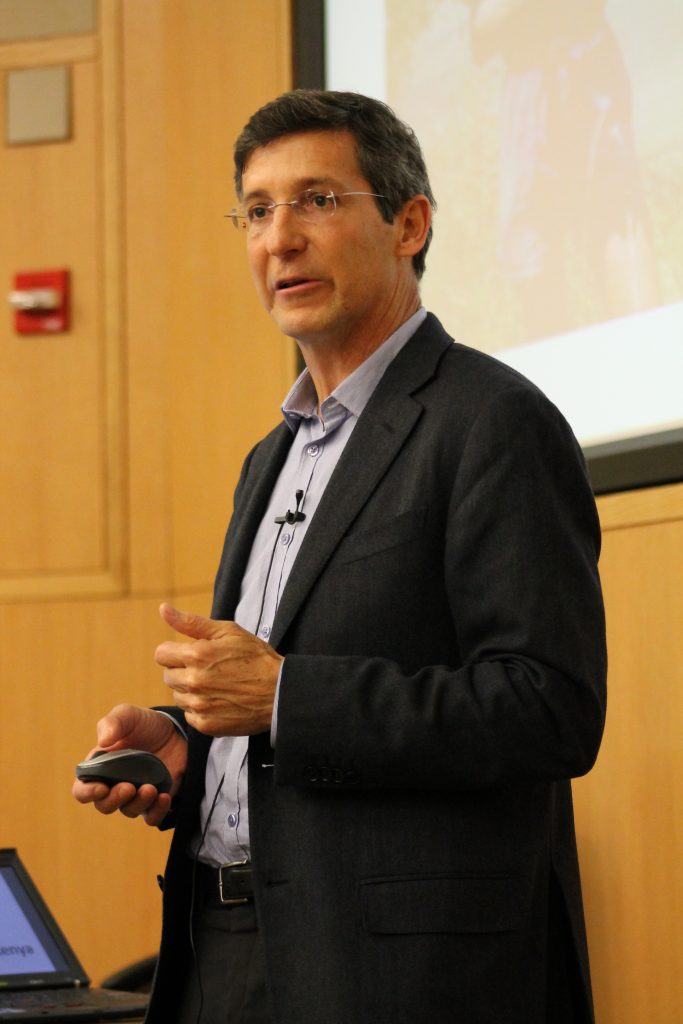This post was written in May 2012 by first year MBA student and CASE Fellow Greg Payne. Greg reflects on a recent visit from Martin Fisher, Co-Founder and CEO of KickStart International. CASE was honored to recently host Martin at Fuqua and award Kickstart the 2012 CASE Enterprising Social Innovation (ESI) Award.
What is the most effective way to address poverty, hunger, and sickness in Sub-Saharan Africa, where 40% go to bed hungry every night and nearly half the population lives on less than $1 a day?
Obviously, this is an incredibly difficult question to answer. There are many excellent methods of intervention – improving access to healthcare, developing clean water systems, establishing safe and secure housing – all of which arguably must be implemented concurrently in order to have maximum impact. But Martin Fisher, Co-Founder and CEO of KickStart, would quickly and confidently answer that the most important method is to give people a way to earn an income.
Through decades of on-the-ground experience in Kenya, Fisher has found that, while there may be gaps in formal education, the poor rural population is incredibly entrepreneurial, often requiring only some technical assistance to identify and develop business ideas, or the technology to execute those ideas. However, Fisher has found that “handouts” are often ineffective. Fisher and KickStart have instead harnessed the power of local markets and the determination of Kenyan farmers’ to fight rural poverty.
KickStart’s approach to improving the condition of rural Kenyan farmers is conceptually straightforward and incredibly effective: for an affordable price, they provide water pump technology that allows farmers to significantly increase the yield from their land. One of KickStart’s best-selling pumps (aptly named the “Super-MoneyMaker”) costs less than $100, and allows farmers to draw water from as much as 30 feet deep and irrigate a 2-acre plot in less than a day – a fraction of which would be possible with buckets shuttled from a nearby well.
Fisher cites many examples of farmers able to pull themselves out of poverty by earning an income, rather than simply surviving. And for some, as Fisher describes, it goes beyond just earning income – with less concern about surviving day-to-day, rural farmers are now empowered. One woman, now earning $3200 per year, organizes other women in her community to speak out against abusive cultural practices. A pump has arguably not only changed her life, but has caused a ripple that is changing her entire community.
KickStart’s impact, by the numbers, is astounding: nearly 130,000 profitable new farm businesses and 650,000 people lifted out of poverty. Enough fruits and vegetables produced to feed 10 million. Speaking for myself, as a business school student intent on working in the social sector, KickStart and Martin Fisher have provided me with an example of how to use business principles – understanding your customer, effective marketing, proper pricing – to address the root cause of poverty. It’s precisely this type of social innovation that expands my understanding of the field and inspires me to further explore its boundaries. After all, for the many complex social issues to address in the world, the solutions often lie in harnessing the very determination and spirit of the population in need.
Watch Martin Fisher’s full lecture here:
About the Award:
CASE launched the Award for Enterprising Social Innovation (ESI) to recognize outstanding individuals, organizations, or companies whose innovations blend methods from the worlds of business and philanthropy to create sustainable social value that has the potential for large-scale impact. CASE awarded the inaugural recipient of the CASE Award for Enterprising Social Innovation (ESI) in the spring of 2009 and accepts nominations from the public annual each spring. Past recipients have included E&Co (2009); VisionSpring (2010); and Benetech (2011).

